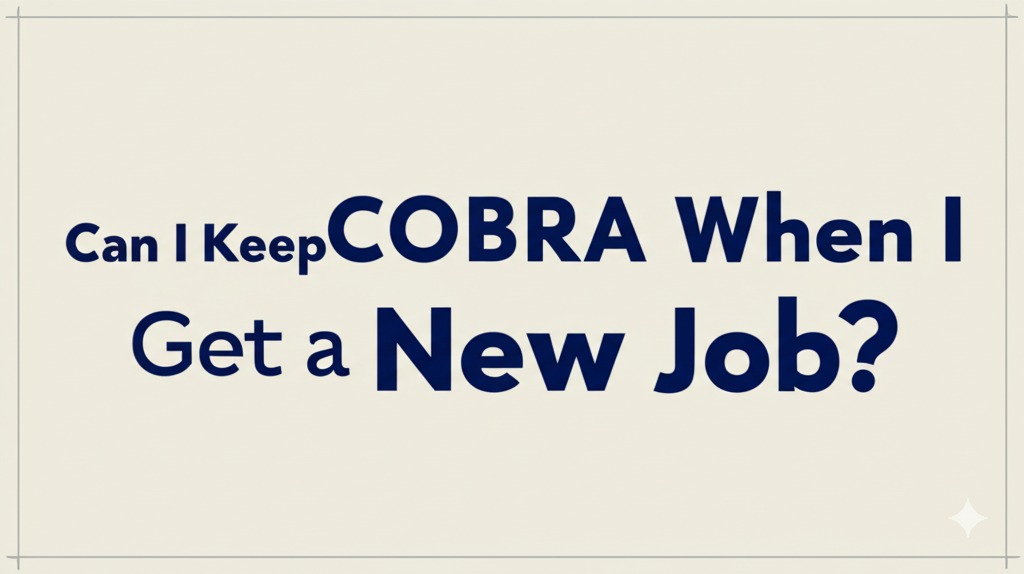
Landing a new job is exciting—but what happens to your COBRA health insurance? If you’re in the middle of COBRA coverage when you get hired somewhere new, it’s important to know your options. Should you drop COBRA? Can you keep it? Is there a benefit to continuing it for a while?
Let’s dive into how COBRA works when you get a new job and what you should consider before making a decision.
What Is COBRA and How Does It Work?
COBRA, which stands for the Consolidated Omnibus Budget Reconciliation Act, gives workers and their families the right to continue their employer-sponsored health coverage after losing a job or experiencing a reduction in work hours.
Here’s how COBRA works in a nutshell:
- You can usually continue the same health plan for up to 18 months.
- You must pay the full premium, including the part your employer used to pay.
- You typically have 60 days to elect COBRA after your job ends or your coverage lapses.
COBRA can be a lifeline during transitions, but it’s often expensive—which is why many people reevaluate it once they land a new job.
Can You Keep COBRA After Getting a New Job?
Yes, you can keep COBRA even after starting a new job. There’s no law requiring you to drop COBRA just because you’re employed again. However, whether it makes sense financially or practically is another matter.
Why You Might Keep COBRA Temporarily
There are several scenarios where keeping COBRA—at least for a while—could be a smart move:
- Waiting period for new job’s health insurance: Some employers have a 30, 60, or even 90-day waiting period before new benefits kick in.
- Your new plan doesn’t cover everything you need: If COBRA includes specialists, medications, or treatments that the new plan doesn’t, it might be worth keeping.
- You’re in the middle of treatment: Sticking with COBRA can ensure continuity of care, avoiding disruptions or new deductibles.
Can You Have COBRA and Employer Insurance at the Same Time?
Technically, yes—but it’s rare and often unnecessary.
If you’re eligible for your new employer’s plan but choose to stay on COBRA, your new employer’s insurance typically becomes your primary coverage, and COBRA becomes secondary. This means:
- Your COBRA plan only pays for things not covered by your employer’s insurance.
- You’ll be paying two premiums—often not worth the cost.
💡 Pro tip: If you enroll in your new employer’s health plan, you can usually drop COBRA—even mid-month. Just make sure you notify your COBRA administrator.
How COBRA Coordinates With New Health Insurance
When switching from COBRA to a new employer plan, it’s essential to avoid a gap in coverage. Here’s how to manage the transition:
Tips for a Smooth Transition
- Check your new job’s insurance start date.
- Does it begin on your hire date or after a waiting period?
- Time your COBRA cancellation carefully.
- Don’t drop COBRA until your new plan is officially active.
- Coordinate prescriptions and appointments.
- Make sure refills or ongoing care aren’t interrupted during the switch.
Cost Comparison: COBRA vs. New Employer Insurance
COBRA coverage is typically much more expensive than employer-sponsored insurance because you’re paying the full premium, plus a 2% administrative fee.
Let’s look at a rough comparison:
| Coverage Type | Monthly Cost (Estimated) |
|---|---|
| COBRA | $600 – $1,000+ |
| Employer Insurance | $150 – $400 (employee share) |
Unless you have specific reasons to keep COBRA, your new employer’s plan will likely save you money.
What If You Lose Your New Job?
If your new job doesn’t work out, you might wonder if you can go back to COBRA from your previous job.
Unfortunately, once you decline or drop COBRA, you generally can’t re-enroll unless you experience another qualifying event. However:
- If you never dropped COBRA, you may still be within the coverage window and can continue it.
- You could also qualify for a new COBRA period if your new job had a group plan and you’re terminated again.
Final Thoughts: Should You Keep COBRA With a New Job?
Here’s the bottom line: You can keep COBRA when you get a new job, but you don’t have to.
✅ Reasons to keep COBRA temporarily:
- Waiting for new benefits to begin
- Your new plan doesn’t meet your medical needs
- You want to avoid changing doctors or treatments mid-care
❌ Reasons to drop COBRA:
- High monthly premiums
- Immediate coverage from your new employer
- No added benefit over your new plan

Andre Cuevas provides career insights, job search strategies, and professional advice to help individuals navigate the job market and achieve their career goals.




